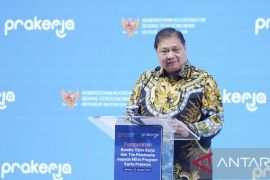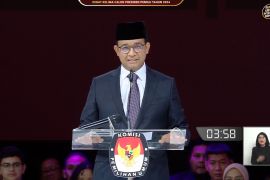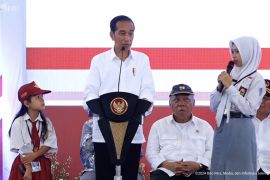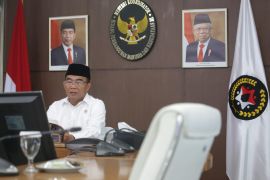"We hope that in future, more Dayak indigenous people would continue their education in universities anywhere in Indonesia," Chairman of the Dayak Customary Council in Balangan District, South Kalimantan Province, Mandan, said.Jakarta (ANTARA News) - Young people of the Dayak indigenous community should be encouraged to pursue higher education in colleges to improve the quality of human resources.
Young people of the Dayak community, which inhabits the mainland of Kalimantan Island, should be supported to pursue higher education at universities to boost the capacity of human resources in order to compete with their counterparts in other areas of Indonesia.
In light of this, Mandan, chairman of the Dayak Customary Council in Balangan District, South Kalimantan Province, said he was working to encourage the youth of Dayak to continue their education at universities.
With rich knowledge and a broad insight, the Dayak community can preserve its ancestral customs and cultures and compete with other members of society in several regions of Indonesia.
"We hope that in future, more Dayak indigenous people would continue their education in universities anywhere in Indonesia," Mandan remarked.
He said that people in various regions and also aboard are aware of the customs and cultures of the Dayak communities, but it would be better if the Dayak people are known more for having extensive knowledge and a broader insight.
"In order to support the local governments programs to improve the human resources of the Dayak community, we are supporting the effort by facilitating young people to pursue higher education in universities, as it will have a positive impact by improving their economy and welfare," he explained.
Ensuring better education for the Dayak community and improving the capacity of its human resources holds significance especially at a time when news on the transfer of the state capital city from Jakarta to one of the provinces on Kalimantan Island is making the rounds.
In Central Kalimantan Province, spokesman of the Kota Waringin Timur district government Halikinnor has remarked that the local people, especially the Dayak community, should take steps in preparation for the state capital being possibly moved from Jakarta to Kalimantan.
"We certainly should be grateful especially if the state capital were to be later relocated to one of the provinces on Kalimantan Island. Hence, the people of Dayak must prepare themselves, so that they are not marginalized," Halikinnor stated recently.
He noted that if the state capital is relocated to Kalimantan Island, job competition will undoubtedly become stiffer, and thus, the local people, especially the Dayak tribe, must prepare themselves to be able to compete with job seekers from outside the region.
Preparations can be made by improving the capacity of human resources, one of them being through gaining mastery of knowledge, technology, and skills as the prerequisites to get employment.
President Joko Widodo had urged Head of the National Development Planning Agency (Bappenas) Bambang Brodjonegoro to conduct a thorough and comprehensive study on the plan to move the capital city from Jakarta in a bid to reduce the heavy burden on the city.
Jakarta has borne the heavy burden not only as a capital city but also as the countrys financial and business center.
"The burden on Jakarta is already too high, as it has served as the center for everything. All parties should have realized that our economic growth could not rely solely on Jakarta. We need to have distribution of new growth centers," Brodjonegoro said.
Until now, Jakarta has served as the center for governance, finance, and business in the country.
Hence, Bappenas is still evaluating the plan to relocate the capital to another city outside Java Island, which has a wider and suitable space.
Brodjonegoro admitted that some cities have the potential to be selected as the new capital city, including Palangka Raya, an idea that had emerged since the era of first president Soekarno in the 1950s.
Brodjonegoro revealed that a Bappenas team had analyzed the criteria of the location, its readiness, and the availability of space, as well as the funding source for the development of the new capital city.
The discourse on relocating the Indonesian state capital of Jakarta can be an option to realize equitable development outside Java Island.
As the worlds most populous island, with more than 60 percent of the population living there, Java has been the most developed of all islands across the country.
Although Java is the fourth-largest island in Indonesia, it accommodates more than half of the nations population and dominates it politically and economically.
Hence, Minister/State Secretary Pratikno has opined that the discourse on the relocation of the state capital can be comprehended as an effort to improve the distribution of development outside Java as well as to save the ecology in the Jakarta Capital Special Region.
After speaking at a workshop on the implementation of the values of the state philosophy of Pancasila, held at the Gajah Mada University in Yogyakarta recently, Pratikno remarked that relocation of the state capital will save the ecology of Jakarta.
The discourse on the relocation of the state capital has indeed become one of the focus areas of the central government today, and it should be placed as an open option to be studied together.
"If the discourse on the transfer of the state capital is not made known, then we will never think about it," the former rector of Gajah Mada University remarked.
So far, economic and development activities are still concentrated in Java, specifically in Jakarta. Money circulation and transportation facilities are also dominant in Jakarta, causing traffic congestion.
Indeed, the idea of transferring the capital was raised long ago by Bung Karno, but it needs to be adapted to the current situation in Indonesia.
"Precisely, since the idea had emerged long ago and was never realized, we need to conduct a review in the current-day context," Pratikno remarked.(*)
Reporter: Otniel Tamindael
Editor: Heru Purwanto
Copyright © ANTARA 2017











